#Saint Ambrose of Milan
Text
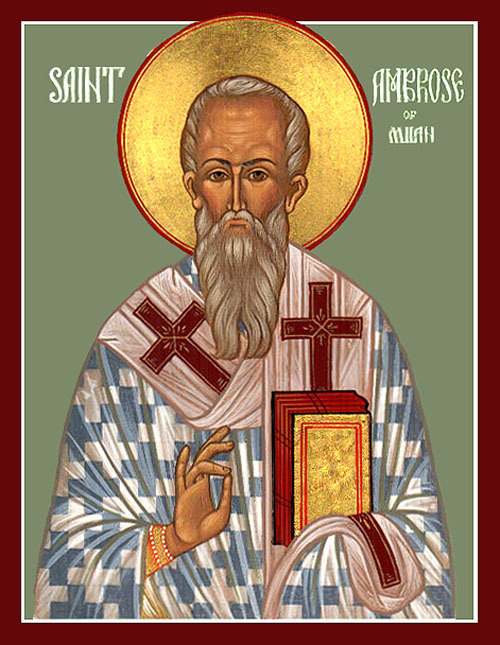
Healing Prayer of Saint Ambrose of Milan
Thee alone I follow, Lord Jesus, Who heals my wounds. For what shall separate me from the love of God, which is in Thee? Shall tribulation, or distress, or famine? I am held fast as though by nails, and fettered by the bonds of charity. Remove from me, O Lord Jesus, with Thy potent sword, the corruption of my sins. Secure me in the bonds of Thy love; cut away what is corrupt in me. Come quickly and make an end of my many, my hidden and secret afflictions. Open the wound lest the evil humor spread. With Thy new washing, cleanse in me all that is stained. Hear me, you earthly men, who in your sins bring forth drunken thoughts: I have found a Physician. He dwells in Heaven and distributes His healing on earth. He alone can heal my pains Who Himself has none. He alone Who knows what is hidden can take away the grief of my heart, the fear of my soul: Jesus Christ. Christ is grace! Christ is life! Christ is Resurrection! Amen.
18 notes
·
View notes
Text
Parallels of Eve: The Joyful Mysteries
Today, as we celebrate the Feast of Adam and Eve in preparation for the feast of the Nativity tomorrow, just some things to think about concerning the First and New Eves.
1. The Annunciation. In the Garden of Eden, Eve is approached by an angel who tempts her into sin. The angel promises that she will be like God, only to become isolated from Him. Thus, with her cooperation, "sin entered the world through one man" (Romans 5:12). At the Annunciation, Mary is approached by an angel who declares to her God's plan, and all of creation awaits her response. Mary will "breathe a passing word, [and] embrace the eternal Word" (St. Bernard). Thus, with her cooperation, "abundance of grace and of the gift of justification come to reign in life through the one person, Jesus Christ" (Romans 5:17).
2. The Visitation. According to one Rabbinic legend, the Fall causes Adam and Eve to temporarily separate from one another. This brokenness in their relationship is only fixed when Eve, who was pregnant at the time of their separation, begins to give birth; her cries of pain bring Adam back, and they reconcile after the birth of Cain. The shared pregnancies of Mary and Elizabeth also bring a family closer together, but without a preceding disruption of family life caused by sin.
3. The Nativity. Eve gives birth to a firstborn boy, naming him Cain, "for I have produced a male child with the help of the Lord" (Genesis 4:1). Mary likewise gives birth to a firstborn boy with the help of the Lord, for the Holy Spirit came upon her and the power of the Most High overshadowed her (Luke 1:35). In this, Eve is the mother of all the living (Genesis 3:20), because through her biological lineage all humans are born. In this, Mary is the mother of the re-created world (St. Anselm), because it is by being incorporated into the Body of her Son that "we live and move and have our being" (Acts 17:28).
4. The Presentation. Through the Fall, Adam and Eve lose the riches of the Lord that they had in Paradise; "by the sweat of [his] brow" will Adam eat his bread; God tells him, "the ground is cursed because of you! In toil you shall eat its yield" (Genesis 3:19, 17). Joseph likewise toils for his bread, and he is a poor man; at the presentation of Jesus at the Temple, he sacrifices two turtles doves (Luke 2:24), which is the alternative sacrifice for a poor man who cannot afford a lamb (Leviticus 12:6-8). There is an important difference, though; for Adam, death is prescribed "as a remedy. Human life was condemned because of sin to unremitting labor and unbearable sorrow [...] there had to be a limit to its evils" (St. Ambrose). This physical and spiritual poverty will not last, now; by being born as a human into Joseph's family, "for your sake [Jesus] became poor although He was rich, so that by His poverty you may become rich" (2 Corinthians 8:9).
5. Finding Jesus in the Temple. Adam and Eve lose a son to a violent death, and in doing so actually lose two sons; Abel is killed, lost to Adam and Eve in the world of the living forever. Cain is alienated from his family, for he has committed the very first murder, and Cain is concerned by the anger of his family: "Anyone may kill me on sight" (Genesis 4:14). A family is fractured beyond repair, at least in this life. Mary and Joseph also lose a Son, but it is a temporary situation; they find Jesus at the Temple, the very home of God, the same God that Adam and Eve hid from and Cain lied to. After finding Jesus, Mary ponders what has occurred in her heart, while Jesus remains obedient to them (Luke 2:51); the temporary loss only serves to strengthen family bonds.
#Christianity#Catholicism#Adam and Eve#Virgin Mary#Rosary#Joyful Mysteries#Jesus Christ#Cain and Abel#The Annunciation#The Visitation#Nativity#Bernard of Clairvaux#Saint Ambrose of Milan#Anselm of Canterbury
60 notes
·
View notes
Photo

"How far, O rich, do you extend your senseless avarice? Do you intend to be the sole inhabitants of the earth? Why do you drive out the fellow sharers of nature, and claim it all for yourselves? The earth was made for all, rich and poor, in common.”
—Saint Ambrose of Milan, 4th Century
[alive on all channels]
#rich and poor#political cartoons#Saint Ambrose of Milan#4th century#timeless problems#eat the rich#Alive On All Channels
25 notes
·
View notes
Text

“The devil tempts that he may ruin; God tests that he may crown.”
― Saint Ambrose of Milan (c. 339 – 4 April 397)
0 notes
Text

St Ambrose barring Theodosius from Milan Cathedral
by Anthony van Dyck
The painting depicts the Roman emperor Theodosius I and his entourage being barred from Milan Cathedral by its archbishop Saint Ambrose, as punishment for the Massacre of Thessalonica
#baroque#history#art#painting#st ambrose#saint ambrose#theodosius#milan#cathedral#anthony van dyck#roman emperor#roman#emperor#theodosius i#archbishop#massacre#thessaloniki#thessalonica#massacre of thessalonica#architecture#europe#european#national gallery#london
42 notes
·
View notes
Photo

Today we also celebrate the memory of the Holy Wonderworking Bishop of Milan, Ambrose. Saint Ambrose fervently opposed the Arian heresy and is known for his strict yet kind character. He has left us many writings on various theological discourses and even liturgical hymns, introducing antiphonal chanting to the West and therefore being the founder of what we know today as Ambrosian Chant. May he intercede for us always + #saint #ambrose #ambrosius #milan #bishop #arian #heresy #hymn #writing #kind #orthodox #saintoftheday (at Milan, Italy) https://www.instagram.com/p/Cl24lGPDksy/?igshid=NGJjMDIxMWI=
19 notes
·
View notes
Text
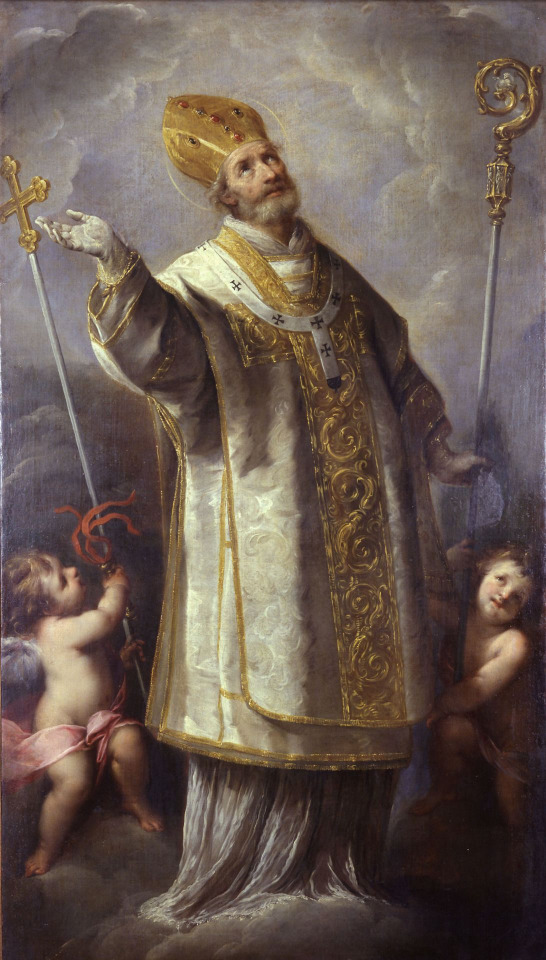
THE DESCRIPTION OF SAINT AMBROSE OF MILAN
Feast Day: December 7
"It is preferable to have a virgin mind than a virgin body. Each is good if each be possible; if it be not possible, let me be chaste, not to man but to God."
Like Augustine himself, the older Ambrose, born around 340, was a highly educated man who sought to harmonize Greek and Roman intellectual culture with the Catholic faith. Trained in literature, law, and rhetoric, he eventually became the governor of Liguria and Emilia, with headquarters at Milan. He manifested his intellectual gifts in defense of Christian doctrine even before his baptism.
While Ambrose was serving as governor, a bishop named Auxentius was leading the diocese. Although he was an excellent public speaker with a forceful personality, Auxentius also followed the heresy of Arius, which denied the divinity of Christ. Although the Council of Nicaea had reasserted the traditional teaching on Jesus' deity, many educated members of the Church – including, at one time, a majority of the world's bishops – looked to Arianism as a more sophisticated and cosmopolitan version of Christianity. Bishop Auxentius became notorious for forcing clergy throughout the region to accept Arian creeds.
At the time of Auxentius' death, Ambrose had not yet even been baptized. But his deep understanding and love of the traditional faith were already clear to the faithful of Milan. They considered him the most logical choice to succeed Auxentius, even though he was still just a catechumen. With the help of Emperor Valentinan II, who ruled the Western Roman Empire at the time, a mob of Milanese Catholics virtually forced Ambrose to become their bishop against his own will. Eight days after his baptism, Ambrose received episcopal consecration on Dec. 7, 374. The date would eventually become his liturgical feast.
Bishop Ambrose did not disappoint those who had clamored for his appointment and consecration. He began his ministry by giving everything he owned to the poor and to the Church. He looked to the writings of Greek theologians like St. Basil for help in explaining the Church's traditional teachings to the people during times of doctrinal confusion. Like the fathers of the Eastern Church, Ambrose drew from the intellectual reserves of pre-Christian philosophy and literature to make the faith more comprehensible to his hearers. This harmony of faith with other sources of knowledge served to attract, among others, the young professor Aurelius Augustinus – a man Ambrose taught and baptized, whom history knows as St. Augustine of Hippo.
Ambrose himself lived simply, wrote prolifically, and celebrated Mass each day. He found time to counsel an amazing range of public officials, pagan inquirers, confused Catholics and penitent sinners. His popularity, in fact, served to keep at bay those who would have preferred to force him from the diocese, including the Western Empress Justina and a group of her advisers, who sought to rid the West of adherence to the Nicene Creed, pushing instead for strict Arianism. Ambrose heroically refused her attempts to impose heretical bishops in Italy, along with her efforts to seize churches in the name of Arianism. Ambrose also displayed remarkable courage when he publicly denied communion to the Emperor Theodosius, who had ordered the massacre of 7,000 citizens in Thessalonica leading to his excommunication by Ambrose. The chastened emperor took Ambrose's rebuke to heart, publicly repenting of the massacre and doing penance for the murders. "Nor was there afterwards a day on which he did not grieve for his mistake," Ambrose himself noted when he spoke at the emperor's funeral.
The rebuke spurred a profound change in Emperor Theodosius. He reconciled himself with the Church and the bishop, who attended to the emperor on his deathbed. St. Ambrose died in 397. His 23 years of diligent service had turned a deeply troubled diocese into an exemplary outpost for the faith. His writings remained an important point of reference for the Church, well into the medieval era and beyond. St. Ambrose has been named one of the 'holy fathers' of the Church, whose teaching all bishops should 'in every way follow.'
Ambrose joins Augustine, Jerome, and Gregory the Great as one of the Latin Doctors of the Church.
#random stuff#catholic#catholic saints#ambrose of milan#san ambrocio#saint ambrose#beekeepers#candlemakers#doctor of the church
2 notes
·
View notes
Text

#traditional catholicism#traditional catholic images#traditional catholic renaissance religious art#traditional catholic father's and doctors of the church#traditional catholic saints#traditional catholic saints images#st. ambrose of milan#traditional catholic saints quotes
5 notes
·
View notes
Photo

(Via Gebre Menfes Kidus)
7 notes
·
View notes
Text
Happy Feast of Saint Ambrose!

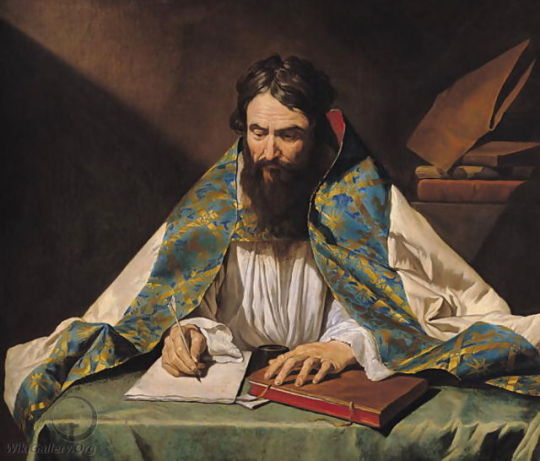
COME, Redeemer of the earth,
and manifest thy virgin-birth.
Let every age in wonder fall:
such birth befits the God of all.
Begotten of no human will
but of the Spirit, Thou art still
the Word of God in flesh arrayed,
the promised fruit to man displayed.
The Virgin’s womb that burden gained,
its virgin honor still unstained.
The banners there of virtue glow;
God in his temple dwells below.
Proceeding from His chamber free
that royal home of purity
a giant in twofold substance one,
rejoicing now His course to run.
O equal to the Father, Thou!
gird on Thy fleshly mantle now;
the weakness of our mortal state
with deathless might invigorate.
Thy cradle here shall glitter bright,
and darkness breathe a newer light
where endless faith shall shine serene
and twilight never intervene.
All praise, eternal Son, to Thee,
whose advent sets Thy people free,
whom, with the Father, we adore,
and Holy Ghost, for evermore. Amen.
-- St. Ambrose's Advent hymn on the Incarnation, as recorded by his student, St. Augustine.
5 notes
·
View notes
Text
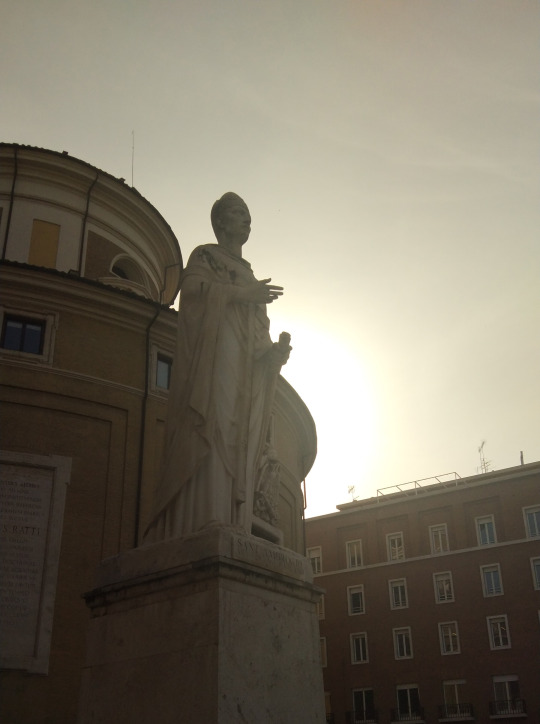
Basilica of Santi Ambrogio e Carlo al Corso, Rome.
#architecture#sculpture#santi ambrogio#saint ambrose#ambrose of milan#catholic church#photography#sunset#warm#summer#my stuff
1 note
·
View note
Text

One Man alone, the Intermediary between God and man, is free from the bonds of sinful birth, because He was born of a Virgin, and because in being born He did not experience the touch of sin.
-- Saint Ambrose of Milan,
5 notes
·
View notes
Note
two silly questions for your scholarly mind, if it pleases
firstly: do you think it is more likely that Paul was married but separated or widowed, or that Paul never married?
and secondly: based on what we know of Paul's life, what do you think was the thorn in Paul's side that he mentions in 2 Corinthians 12?
I'm going to start with the second question, because this was something that had interested me. The Church Fathers seem split as to whether the "thorn in [Paul's] flesh" refers to a disability (Anselm of Canterbury, Bede the Venerable, Jerome), a serious temptation of some kind (Hugh of Saint-Cher), or the persecutions he faced on behalf of the Gospel (John Chrysostom, Ambrose of Milan, Theophylact of Ohrid).
I don't really have a strong argument for one of these possibilities over the other, but I will say that emotionally, I have an attachment to the disability interpretation; my "born again" moment roughly coincided with my own diagnosis of a chronic auto-immune disease, and so I often read 2 Corinthians 12:9-10 through the lens of my illness.
As for whether Paul was married, I don't know. It was normative for Pharisees, and is normative for Rabbis, to be married; while it was not universally required, there were at least some times and places where ordination would not be granted to unmarried men, studying certain forms of theology was limited to married men, and membership in the Sanhedrin required one to be married. Given Paul's adherence to the Law and his being "a zealot for [his] ancestral traditions," (Galatians 1:14) it would make sense that he was married. I don't know, though.
#Christianity#Catholicism#Saint Paul#2 Corinthians#Anselm of Canterbury#Saint Ambrose of Milan#Theophylact of Ohrid#Saint Jerome#Saint Bede#disability#temptation#persecution#Judaism#marriage#asks#Letter to the Galatians
7 notes
·
View notes
Text
Some interesting things I found while doing some research on the origin of the name Ambrose:
(If this has already been pointed out, apologies!)

I know the given name's meaning is more linked to god-like rather than immortality (although those concepts are definitely linked.) The theme of immortality is very relevant to Ambrose and Vincent. He encased dead and alive bodies in wax giving them an immortal second life.

But also, Saint Ambrose is the patron saint of bees, beekeepers, wax melters, and candlemakers, which is a more direct, but still very clever, reference by the writers.

Saint Ambrose's father describes him as having a 'honeyed tongue', which doesn't always have a positive meaning.

This sounds like Bo with his placating words, leading Wade and Carly around Ambrose with all his little excuses about that damned 15-inch fan belt.
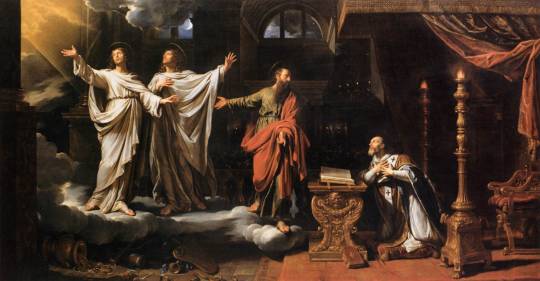
"The twin brothers Gervase and Protase are considered the first martyrs of Milan as Saint Ambrose, guided by a vision, unearthed their remains in 386. The martyrs appeared to Saint Ambrose in an apparition."
Twin brothers, martyrs who would eventually be venerated as saints themselves, appeared to Saint Ambrose in a vision. This led to the discovery of their buried remains.
"...We found two men of marvelous stature, such as those of ancient days. All the bones were perfect, and there was much blood."
These parallels, coincidences—whatever you want to call it—are just very interesting.
91 notes
·
View notes
Text

Saint Ambrose
Doctor of the Church
337-397
Feast day: December 7
Patronage: Beekeeping
Saint Ambrose, an early “Father” and Doctor of the Church, was an educated lawyer and a Roman governor of Milan, with wealth and prestige. In 374 he was elected Bishop by popular demand, even though he was just a catechumen. From that point on he gave his wealth to the poor and for ransom. He learned theology and scripture from St. Simplican. At one point, he even excommunicated the Emperor Theodosius. He fought the Arian heresy and pursued sanctity throughout his life. St. Augustine’s conversion is attributed to St. Ambrose’s reasoning and logic.
Prints, plaques & holy cards available for purchase here: (website)
64 notes
·
View notes
Text
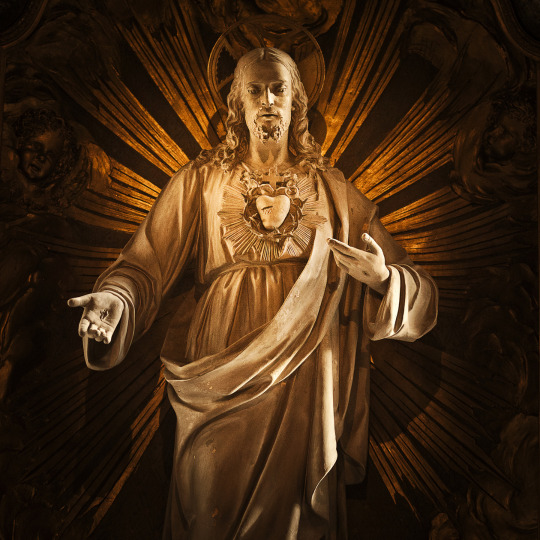
"The heart of Jesus is a refuge for sinners and a sanctuary for the suffering." - #SaintPadrePio #FirstDay
📷 Chapel of the Sacred Heart in the Basilica of Saint Ambrose, Milan, Italy / © THEPALMER / #GettyImages. #Catholic_Priest #CatholicPriestMedia
81 notes
·
View notes